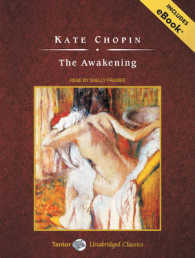- ホーム
- > 洋書
- > 英文書
- > Politics / International Relations
Full Description
This book reflects on Nigeria's fourth republic, the country's longest democratic period since it gained independence from Great Britain. It argues that although constitutional or political democracy has lasted for over two decades in Nigeria and seen three successful democratic changes of power, Nigeria's democracy remains largely militarised.
During Nigeria's fourth republic, political and socio-economic affairs have been increasingly dominated by a pervasive military presence and ideology, which has seen a redistribution of resources and government funds away from social programmes into an increase in security budgets, weapons proliferation, and internal military interventions and occupations. This institutionalisation of violence has turned the country into a national security state where the rule of force and violence rather than dialogue and compassion reflect everyday reality. Whilst acknowledging the history of militarisation during colonial and military rule, this book makes a compelling argument for considering the distinct character of the Nigerian nation state's path to militarisation over the last 20 years of experimentation with democracy.
This book's fresh insights into the fourth republic's path to militarisation will be of interest to researchers of African politics, security and development.
Contents
1. General Introduction: Nigeria's Militarized Democracy 2. The Colonial Legacy Argument 3. The Military Rule Legacy Argument 4. Beyond the Colonial and Military Rule Narratives 5. Non-State Armed Groups, Resistance Movements and the Militarised State 6. Patriarchy and Nigeria's Gendered Security 7. Militarisation and Nigeria's Foreign Policy 8. Conclusion: Building a Stable and Demilitarised Democracy: Threats and Opportunities








